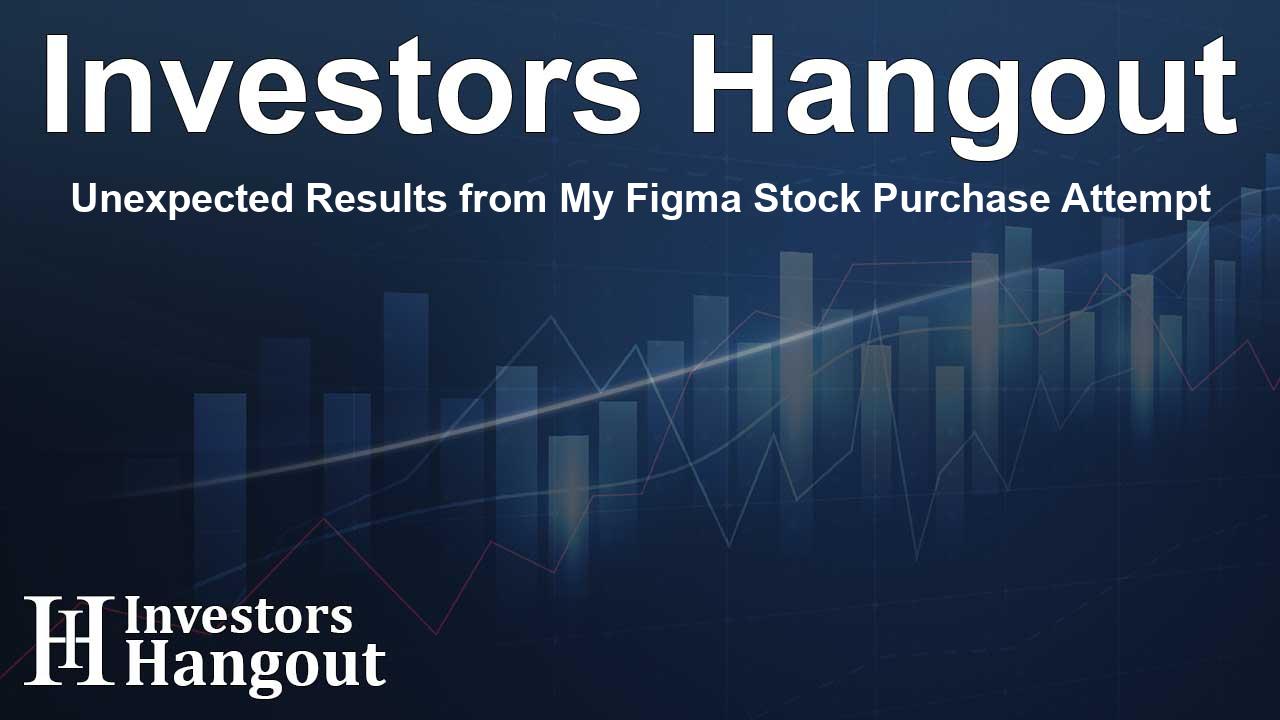Unexpected Results from My Figma Stock Purchase Attempt

Figma Inc. IPO Experience
Recently, Figma Inc. launched its initial public offering (IPO), marking a significant event in the design-tech industry. As the collaborative platform favored by numerous companies, including industry giants, the anticipation surrounding this IPO was palpable.
The excitement was fueled further by Adobe's notable buyout attempt in the previous year, establishing Figma as a highly sought-after stock. It was a day when many investors had circled their calendars, eager to dive into what they believed would be a lucrative opportunity.
My Attempt to Acquire Figma Shares
With excitement in the air, I eagerly set out to purchase 1,000 shares of FIG before trading commenced. The experience turned out to be a rollercoaster ride that left me surprised and, to some extent, bewildered.
On IPO day, FIG opened at an astounding $85, quickly climbing higher and elevating the stock's value significantly. As I started to calculate potential profits based on tripling share prices, I was filled with a mix of anticipation and optimism.
The Challenge of IPO Access
If you're a retail trader, accessing shares during IPOs has historically been a challenge, with major banks typically securing the best allocations. However, Robinhood's introduction of the IPO Access program in 2021 transformed how everyday investors engage with IPOs, leveling the playing field a bit.
When I discovered Figma was available through this program, I quickly submitted my request for 1,000 shares at the maximum price. I received a confirmation, feeling hopeful that I was on the brink of a valuable investment.
Reality Hits on IPO Day
The surge of excitement quickly turned to shock as I opened the follow-up email from Robinhood. I discovered that my request for 1,000 shares only resulted in the allocation of a single share at the desired price. Surprised, I realized that Robinhood employs a random allocation process, similar to a lottery, where share distribution is not guaranteed.
The oversubscription of Figma's IPO led to this situation, with overwhelming demand leading to limited retail allocations. Many investors, myself included, found themselves shortchanged, receiving only a small fraction of what they had hoped for.
Understanding the Allocation Process
Now, Robinhood's approach means your chance of acquiring shares is largely randomness-based, irrespective of your account size. It underscores the unpredictable nature of IPO participation for retail investors. Amidst the public outcry, observers shared their disappointment on social media, highlighting the challenge faced by users who were not lucky enough to obtain shares at all.
Interestingly, Figma's stock isn't a typical turnaround opportunity either. Selling within 30 days results in restrictions from participating in future IPOs, which means I decided to keep my single share as a memorable token of this venture.
Future Opportunities with Options Trading
Despite my limited acquisition, the excitement surrounding FIG isn't over yet. With the rise of options trading, opportunities are re-emerging for traders keen on capitalizing on short-term movements. Thanks to recent SEC developments, options can now go live shortly after an IPO when specific conditions are met.
Currently, options trading for FIG is becoming available across multiple trading platforms. While the temptation is to jump right in, I'll be watching closely for the right trading setup to emerge. Opportunities don't vanish; they evolve, allowing for strategic exploration.
Conclusion
Even if your IPO experience didn’t yield the desired results, like mine, it’s essential to remain optimistic. The market continues to present new chances for engagement, offering various strategies beyond initial share purchases.
My journey with Figma may not have resulted in the significant stock ownership I initially envisioned, but it has opened my eyes to the evolving nature of investing and the tools available for traders striving to excel.
Frequently Asked Questions
What is Figma and why is it significant?
Figma is a collaborative design platform extensively used by various companies for product design and development.
How did Robinhood change access to IPOs?
The introduction of Robinhood's IPO Access program allowed retail investors to purchase shares before they became publicly available, democratizing access.
Why was Figma's IPO so popular?
The anticipation was driven by its widespread usage among top companies and a notable buyout attempt by Adobe, creating heightened demand.
What happens if I sell IPO shares within 30 days?
Selling shares within 30 days may impose restrictions on your ability to participate in future IPOs, according to Robinhood's policy.
Can I still invest in Figma despite not acquiring shares initially?
Yes, new opportunities through options trading and future market fluctuations can still provide potential for investments in Figma.
About The Author
Contact Olivia Taylor privately here. Or send an email with ATTN: Olivia Taylor as the subject to contact@investorshangout.com.
About Investors Hangout
Investors Hangout is a leading online stock forum for financial discussion and learning, offering a wide range of free tools and resources. It draws in traders of all levels, who exchange market knowledge, investigate trading tactics, and keep an eye on industry developments in real time. Featuring financial articles, stock message boards, quotes, charts, company profiles, and live news updates. Through cooperative learning and a wealth of informational resources, it helps users from novices creating their first portfolios to experts honing their techniques. Join Investors Hangout today: https://investorshangout.com/
The content of this article is based on factual, publicly available information and does not represent legal, financial, or investment advice. Investors Hangout does not offer financial advice, and the author is not a licensed financial advisor. Consult a qualified advisor before making any financial or investment decisions based on this article. This article should not be considered advice to purchase, sell, or hold any securities or other investments. If any of the material provided here is inaccurate, please contact us for corrections.
